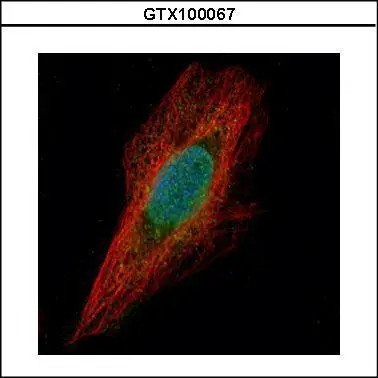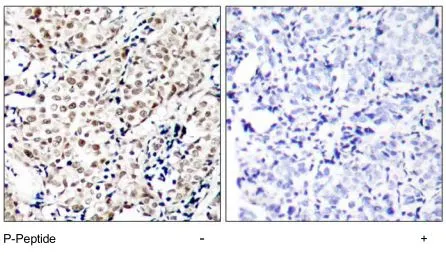
Confocal immunofluorescence analysis (Olympus FV10i) of paraformaldehyde-fixed HeLa, using Chk1(GTX100067) antibody (Green) at 1:500 dilution. Alpha-tubulin filaments were labeled with GTX11304 (Red) at 1:2000.
Chk1 antibody [C1C2-3], Internal
GTX100067
ApplicationsImmunoFluorescence, ImmunoCytoChemistry
Product group Antibodies
ReactivityHuman
TargetCHEK1
Overview
- SupplierGeneTex
- Product NameChk1 antibody [C1C2-3], Internal
- Delivery Days Customer9
- Application Supplier NoteICC/IF: 1:100-1:1000. *Optimal dilutions/concentrations should be determined by the researcher.Not tested in other applications.
- ApplicationsImmunoFluorescence, ImmunoCytoChemistry
- CertificationResearch Use Only
- ClonalityPolyclonal
- Concentration1 mg/ml
- ConjugateUnconjugated
- Gene ID1111
- Target nameCHEK1
- Target descriptioncheckpoint kinase 1
- Target synonymsCHK1, OZEMA21, serine/threonine-protein kinase Chk1, CHK1 checkpoint homolog, Checkpoint, S. pombe, homolog of, 1, Chk1-S, cell cycle checkpoint kinase
- HostRabbit
- IsotypeIgG
- Protein IDO14757
- Protein NameSerine/threonine-protein kinase Chk1
- Scientific DescriptionRequired for checkpoint mediated cell cycle arrest in response to DNA damage or the presence of unreplicated DNA. May also negatively regulate cell cycle progression during unperturbed cell cycles. Recognizes the substrate consensus sequence [R-X-X-S/T]. Binds to and phosphorylates CDC25A, CDC25B and CDC25C. Phosphorylation of CDC25A at Ser-178 and Thr-507 and phosphorylation of CDC25C at Ser-216 creates binding sites for 14-3-3 proteins which inhibit CDC25A and CDC25C. Phosphorylation of CDC25A at Ser-76, Ser-124, Ser-178, Ser-279 and Ser-293 promotes proteolysis of CDC25A. Inhibition of CDC25 activity leads to increased inhibitory tyrosine phosphorylation of CDK-cyclin complexes and blocks cell cycle progression. Binds to and phosphorylates RAD51 at Thr-309, which may enhance the association of RAD51 with chromatin and promote DNA repair by homologous recombination. Binds to and phosphorylates TLK1 at Ser-743, which prevents the TLK1-dependent phosphorylation of the chromatin assembly factor ASF1A. This may affect chromatin assembly during S phase or DNA repair. May also phosphorylate multiple sites within the C-terminus of TP53, which promotes activation of TP53 by acetylation and enhances suppression of cellular proliferation.
- ReactivityHuman
- Storage Instruction-20°C or -80°C,2°C to 8°C
- UNSPSC12352203


![Chk1 (phospho Ser317) antibody detects Chk1 (phospho Ser317) protein at nucleus by immunofluorescent analysis. Sample: Mock and treated HeLa cells were fixed in 4% paraformaldehyde at RT for 15 min. Green: Chk1 (phospho Ser317) stained by Chk1 (phospho Ser317) antibody (GTX132170) diluted at 1:50. Red: alpha Tubulin, a cytoskeleton marker, stained by alpha Tubulin antibody [GT114] (GTX628802) diluted at 1:1000. Blue: Fluoroshield with DAPI (GTX30920).](https://www.genetex.com/upload/website/prouct_img/normal/GTX132170/GTX132170_44601_20220916_ICC_IF_treatment_UVC_22110201_367.webp)
![Untreated (–) and treated (+) HCT116 whole cell extracts (30 μg) were separated by 10% SDS-PAGE, and the membrane was blotted with Chk1 antibody [ST57-09] (GTX01101) diluted at 1:500. The HRP-conjugated anti-rabbit IgG antibody (GTX213110-01) was used to detect the primary antibody.](https://www.genetex.com/upload/website/prouct_img/normal/GTX01101/GTX01101_HM0401_20220211_WB_treatment_Cisplatin_peptideblocking_w_23053121_692.webp)
![Untreated (–) and treated (+) C2C12 whole cell extract (30 μg) were separated by 10% SDS-PAGE, and the membrane was blotted with Chk1 (phospho Ser345) antibody [C1C2], Internal (GTX100065) diluted at 1:1000. The HRP-conjugated anti-rabbit IgG antibody (GTX213110-01) was used to detect the primary antibody, and the signal was developed with Trident ECL plus-Enhanced.](https://www.genetex.com/upload/website/prouct_img/normal/GTX100065/GTX100065_43775_20220701_WB_M_treatment_UVC_22070501_509.webp)
![CHK1 antibody [C1C2-6], Internal detects Chk1 protein at nucleus by immunofluorescent analysis. Sample: HeLa cells were fixed in 4% paraformaldehyde at RT for 15 min. Green: Chk1 protein stained by CHK1 antibody [C1C2-6], Internal (GTX100070) diluted at 1:500. Red: alpha Tubulin, a cytoskeleton marker, stained by alpha Tubulin antibody [GT114] (GTX628802) diluted at 1:1000. Blue: Hoechst 33342 staining.](https://www.genetex.com/upload/website/prouct_img/normal/GTX100070/GTX100070_39421_20150410_IFA_w_23053123_662.webp)
![Chk1 (phosphpo Ser345) antibody [HL122] detects Chk1 (phosphpo Ser345) protein at nucleus by immunofluorescent analysis. Sample: Mock and treated HCT116 cells were fixed in 4% paraformaldehyde at RT for 15 min. Green: Chk1 (phosphpo Ser345) stained by Chk1 (phosphpo Ser345) antibody [HL122] (GTX635572) diluted at 1:500. Blue: Fluoroshield with DAPI (GTX30920).](https://www.genetex.com/upload/website/prouct_img/normal/GTX635572/GTX635572_44074_20220325_ICC_IF_treatment_Cisplatin_w_23061202_975.webp)
![Chk1 antibody [6F5] detects Chk1 protein by Western blot analysis. A. 30 μg 293T whole cell lysate/extract B. 30 μg HeLa whole cell lysate/extract C. 30 μg A375 whole cell lysate/extract 10 % SDS-PAGE Chk1 antibody [6F5] (GTX70303) dilution: 1:500](https://www.genetex.com/upload/website/prouct_img/normal/GTX70303/GTX70303_41099_WB_w_23061221_419.webp)

![WB analysis of A431 (1), HeLa (2), NIH3T3 (3) and K562 (4) cell lysate using GTX83385 Chk1 antibody [2G1D5].](https://www.genetex.com/upload/website/prouct_img/normal/GTX83385/GTX83385_20170912_WB_w_23061322_441.webp)